Never Events in medical negligence happen in any care setting. The NHS issues guidelines to eliminate Never Events, but they still occur. You can claim medical negligence when a Never Event happens to you.
Never Events in medical negligence leave you, the patient, vulnerable. Never events are when medical professionals do not follow official guidance and damage your health.
In medical negligence, someone has not done their job correctly. The doctor misses something on a scan, the nurse doesn’t log a blood pressure reading, or the GP misses your heart attack. Never Events are medical negligence, too, and you can claim compensation.
A No Win No Fee medical negligence solicitor will take your Never Event case and file for the compensation due to you for the harm done to your health.
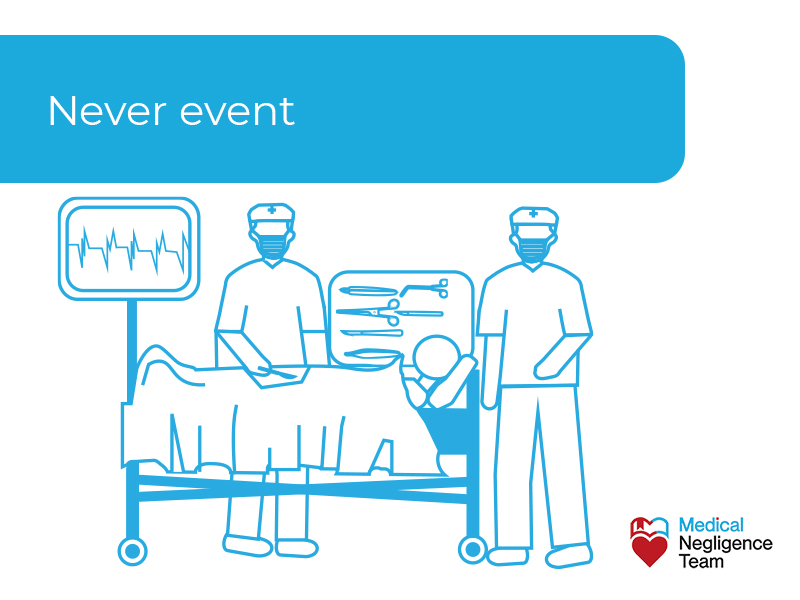
Table of content
What is a Never Event?
A Never Event is a serious preventable incident during your medical treatment. The NHS calls it a Never Event because it should not happen but does because someone has not followed official guidance.
Every hospital has NHS guidance on patient care. The protocols cover all aspects of patient care, from surgery to emergency treatment and overnight stays in a ward. A Never Event can happen when the hospital does not implement the guidance fully.
A Never Event is medical negligence. It is the preventable error during surgery, the administration of the wrong medication in hospital, or the fall when a patient is under care. Events which should not happen, but they do, and the patient suffers.
Your No Win No Fee medical negligence solicitor will take your compensation case against those responsible for the Never Event happening during your care.
Who can be responsible for Never Events in medical negligence?
The NHS Trust running your hospital is responsible for the Never Event in medical negligence. The NHS Trust is responsible for implementing NHS guidance and ensuring that all staff are fully trained for working in the hospital.
A surgeon or medical professional can also be responsible for a Never Event in medical negligence. They are responsible if a Never Event error happens under the surgeon’s watch.
When a doctor makes a medication error, they are responsible for the Never Event, which would not happen if they followed NHS guidelines.
A Never Event is serious medical negligence and should not be taken lightly by the hospital or the professional responsible. If you are the victim of a Never Event, your health could be in danger.
You should contact a No Win No Fee medical negligence solicitor when you suffer from a Never Event. They will have the experience from previous Never Event cases to guide your claim for compensation.
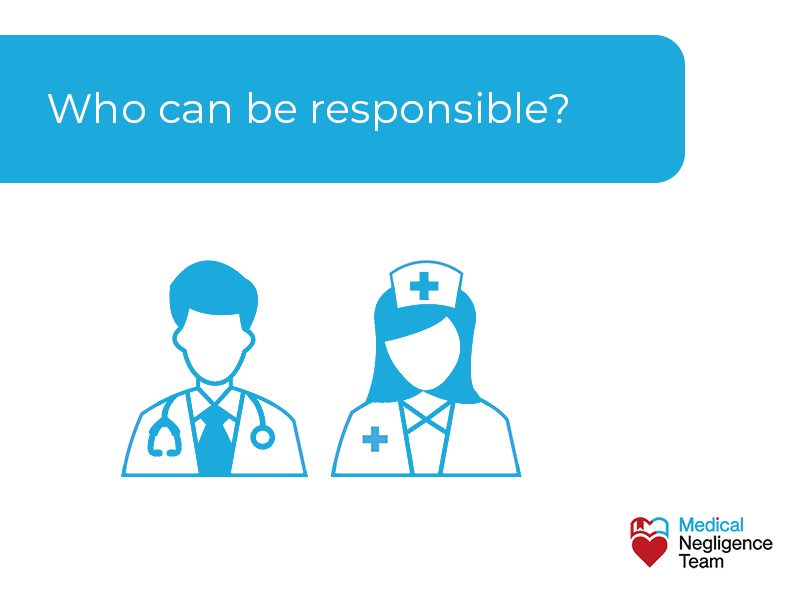
Examples of common Never Event cases in medical negligence
Examples of common Never Event cases in medical negligence range from surgical errors to mistakes in patient care.
A Never Event is preventable, yet Never Events happen regularly due to medical professionals not following official guidance.
Examples of common Never Event cases in medical negligence are:
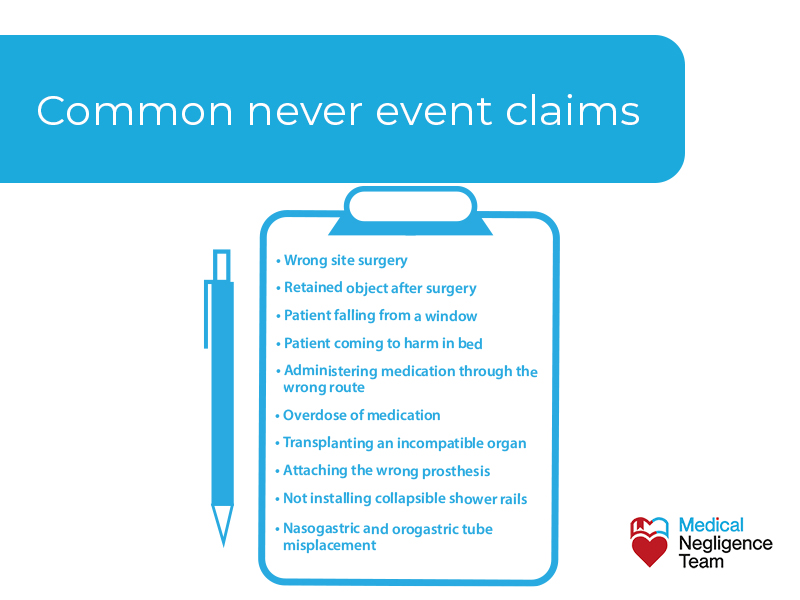
Wrong site surgery
Wrong site surgery, such as removing the wrong leg during an amputation, should never happen. Hospital guidelines have strict procedures to prevent this Never Event and others like it.
Cardiac procedures on the wrong artery or surgery on the wrong eye are Never Events that happen due to medical negligence. Operating on the left instead of the right foot or removing the incorrect fallopian tube are further examples.
In all Never Event surgical errors, the mistake is only noticed after surgery has begun and when protocols have not been followed.
Retained object after surgery
Retained object after surgery is when a foreign object is left inside the patient. A swab, surgical instrument or part of one can be retained inside the body, causing discomfort and infection.
The surgeon and their team should count and check all items used in surgery. If one or more is not accounted for, the protocols must be followed, and the item found.
It is a Never Event when a retained object during surgery is not noticed at the time and goes on to harm the patient.

Patient falling from a window
Patient falling from a window that is not properly secured may result in death or severe injury. According to NHS guidelines, every window must be secured and not accessed by patients.
If a patient can open a window and fall out, the hospital’s duty of care is to secure it. A restrictor must be fitted to all windows within reach of any patients.
When a patient falls from an unsecured window, it is seen as a Never Event and a form of medical negligence.
Patients coming to harm in bed
Patients coming to harm in bed, either by getting their head stuck in bedrails or the frame, is another Never Event. Every bedrail must have the correct dimensions, and the mattress must fit the bed thoroughly.
If patients harm themselves by trapping their heads or body in the bedrails or frame, they could choke to death. An unsupervised patient could do a lot of harm.
Never Events like this one apply to all hospital beds, care home or even a home bed if supplied by the NHS.
Administering medication through the wrong route
Administering medication through the wrong route covers those drugs intended for intravenous administration given orally or vice versa.
The Never Event also refers to intravenous cancer drugs given via the intrathecal route and oral medications not administered through the mouth.
Many medications are designed for administration via one route only, and to do otherwise is a Never Event which can harm the patient.
Overdose of medication
Overdose of medication as a Never Event refers to cancer drugs and insulin being given at too high a dose.
All medications should be administered as prescribed by the doctor. When the nurse or doctor does not follow guidelines or read the dose correctly, an overdose can happen.
A Never Event of a medication overdose may continue for some time before the oversight is spotted.
Transplanting an incompatible organ type
Transplanting an incompatible organ type will do serious and immediate damage to a patient’s health. If left unnoticed, the death of a patient or permanent damage to internal organs can result.
A patient’s immune system can reject an incompatible organ when it does not match. If this happens, even though the team should be aware of the incompatibilities, it is seen as a Never Event.
Attaching the wrong prosthesis
Attaching the wrong prosthesis is a Never Event which is easily avoidable but can happen due to medical negligence.
The surgeon and team must identify and list the correct prosthesis before surgery. For a mistake to happen and the wrong knee joint or hip to be inserted is a perfect example of a Never Event.
Similar Never Events cover inserting the wrong implant strength in cataract surgery or contraceptive device during surgery.
Not installing collapsible shower rails
Not installing collapsible shower rails in a mental health setting leaves the bathroom suitable for a suicide attempt.
All areas should be proofed to protect those in mental health care. The shower rails should be collapsible and checked regularly.
If a patient attempts to take their own life, the rail should collapse, and it is a Never Event and medical negligence if this does not happen.
Nasogastric and orogastric tube misplacement
Nasogastric and orogastric tube misplacement is when the tube used for feeding or administering medication is inserted incorrectly, but this is not detected before a procedure.
The results can severely harm the patient and even cause death in some unfortunate circumstances.
A Never Event is preventable, and the correct placement and checking of such tubes would stop the danger to the patient.
Never Events are identified by the NHS to prevent them from happening. They are examples of medical negligence that can happen but would not if the medical professional follows the official guidance.
If you or a loved one is the victim of a Never Event, it can be challenging to know what to do next.
What to do if you are a victim of a Never Event
If you are the victim of a Never Event, you claim compensation against those responsible. A Never Event is classed as such to avoid it happening and harming a patient, yet they happen.
The NHS knows Never Events happen and has introduced protocols for their prevention. The guidelines are regularly updated, and all staff are informed of changes in training and through management.
When you are a victim of a Never Event, you should contact a medical negligence solicitor with experience in dealing with Never Events in medical negligence.
They will take on the case and make your claim for Never Event negligence.
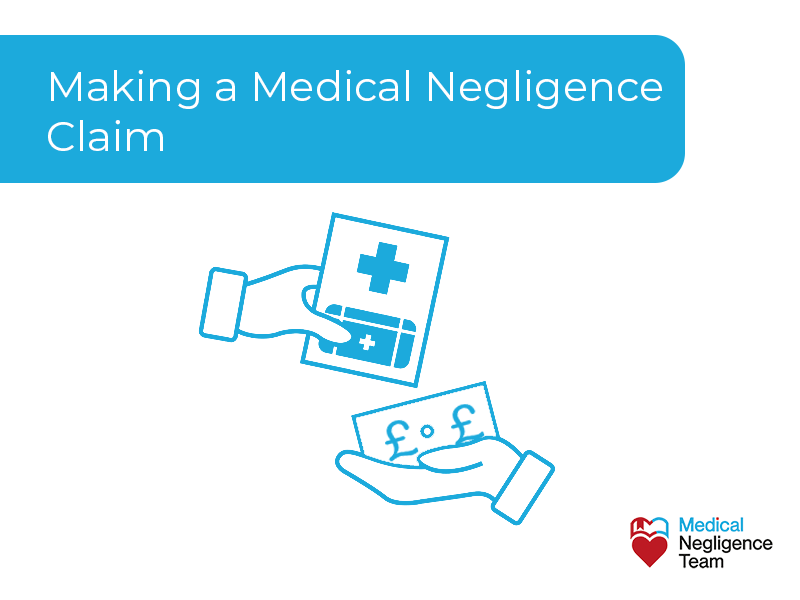
How much can I claim for a Never Event claim?
You can claim compensation from over £5,000 to more than £250,000 for Never Event negligence. The amount you claim depends on the damage caused, and there is not one fixed award in any medical negligence claim.
The amount of compensation differs from patient to patient, depending on the circumstances and effects of the Never Event negligence. Never Events can affect someone for life, and compensation claims reflect the patient’s complex needs.
When claiming Never Event negligence, you are looking for compensation for what happened at the hands of a medical professional or in a care setting. The lack of care caused temporary or permanent injury, and you deserve compensation for the suffering.
As in all medical negligence claims, each Never Event negligence case is dealt with on its merits and how much you suffered.
A No Win No Fee medical negligence solicitor will be the only one to advise you on a Never Event negligence claim. They will know from experience what your case may be worth and how to go about a successful claim.
Your No Win No Fee medical negligence solicitor will handle your Never Event negligence claim and get you compensation for all damages incurred.
What can you claim for when you sue for Never Event negligence?
You can claim compensation for any damages that occurred when you sue for Never Event negligence.
There are two types of compensation damages due when suing for any type of medical negligence: General damages and Special damages.
General damages
General damages are when you sue for the pain, suffering and the loss of amenity, PSLA, you have experienced due to negligence.
Special damages
Special damages include loss of earnings, future care costs, and out-of-pocket expenses.
Be sure to keep payslips, receipts and proof of any losses you experience as a result of the medical negligence.
You deserve compensation to cover all losses, including loss of life, medical costs and any long-term care needs.
You make a compensation claim when you or a loved one suffers from the effects of Never Event negligence.
Your No Win No Fee solicitor will guide you through the steps in making a Never Event negligence claim.
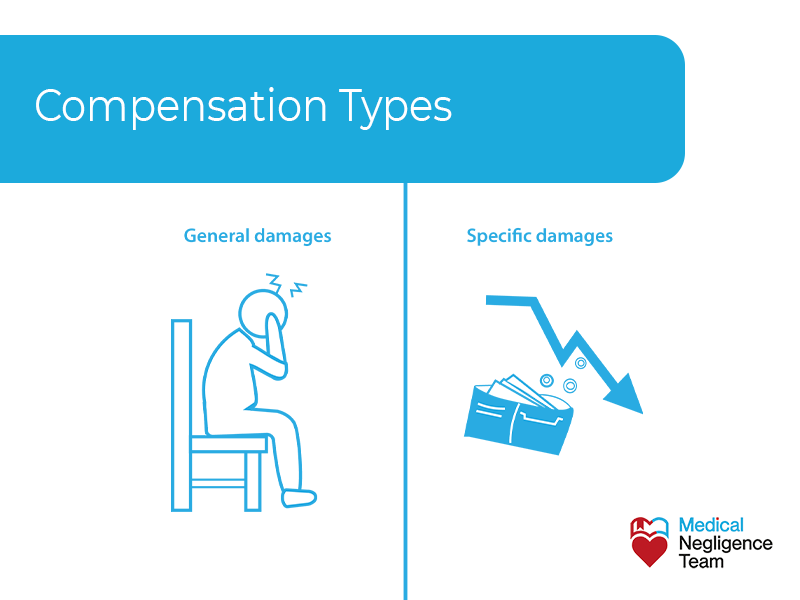
What are the steps involved in making a Never Event negligence claim?
The steps involved in making a Never Event negligence claim go from seeking medical advice to issuing court proceedings.
The steps are a part of any successful compensation case, and settlement can happen at any stage in the process.
Your medical negligence solicitor will do the rest when you follow the steps correctly and get all the facts and figures together.
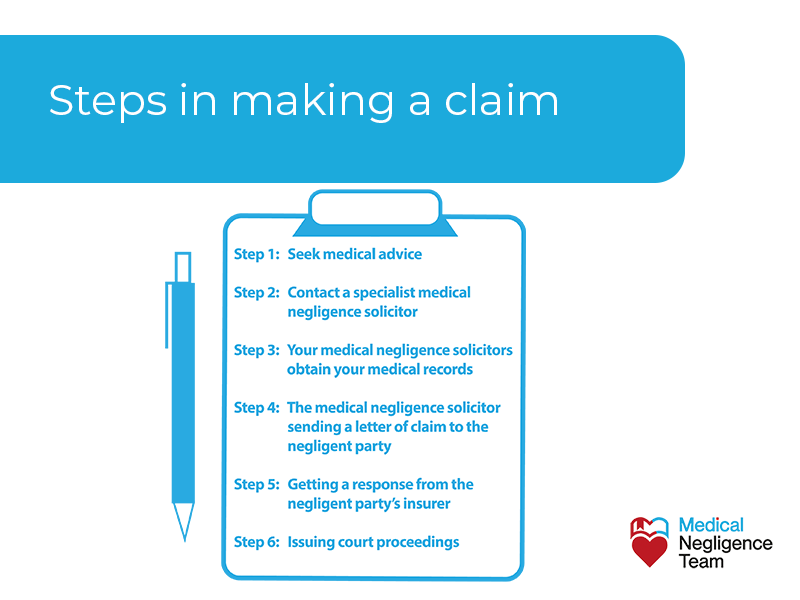
Step 1: Seek medical advice
Seek medical advice on the injuries you have suffered or are suffering with immediately you realise you experienced Never Event negligence.
Step 2: Contact a specialist medical negligence solicitor
Contact a specialist medical negligence solicitor who operates on a No Win No Fee basis and tell them what went wrong. The right solicitor will look at your case, see where the problem lies, and advise if you have a Never Event negligence claim.
The Medical Negligence Team also have a 100% Compensation Guarantee scheme, where you get all the money awarded in a negligence claim.
You are the one who suffered medical negligence, and you should get all the money due for the suffering.
Step 3: Your medical negligence solicitor obtains your medical records
Your medical negligence solicitor obtains your medical records with your permission. By reading your records, they will confirm if they think you have a valid Never Event negligence claim.
The medical negligence team will know from your medical records if the case will result in compensation being paid.
Step 4: The medical negligence solicitor sending a letter of claim to the negligent party
The medical negligence solicitor sending a letter of claim to the negligent party is the next step. The letter will ask them to admit the Never Event negligence in what is known as ‘sending a letter of claim.’
When the negligent party receives the letter of claim, it has up to four months to provide a written response.
Step 5: Getting a response from the negligent party’s insurer
Getting a response from the negligent party’s insurer will move your compensation claim closer to a conclusion.
The insurer will either admit the medical negligence or say they intend to defend the case. Deciding to defend the case is known as ‘deny liability’ in legal terms.
If they admit liability, your Never Event negligence claim can be valued, and the two parties will meet to decide on your compensation payment.
Your solicitor will negotiate with the negligent party and use their experience to get the compensation you deserve.
Step 6: Issuing court proceedings
Issuing court proceedings is the next step if they deny liability in your Never Event negligence claim.
Going to court happens, too, when they are not prepared to pay a fair amount for the injuries you have suffered. Your medical negligence solicitor issues the court proceedings.
Remember that less than 1% of medical negligence cases end up in court, and very few of those cases ever make it to the courtroom.
Using a No Win No Fee solicitor
Using a No Win No Fee solicitor is the only way to a successful Never Event negligence compensation claim. Your No Win No Fee medical negligence solicitor will not charge you for a claim you do not win.
Always have a fee agreement in place before engaging a medical negligence solicitor. If they start talking of a ‘win fee’ or a ‘success fee,’ you should walk away. The negligent party insurers should pay all fees.
The medical negligence solicitor should also operate a 100% Compensation Guarantee scheme. When you win the case, all the money awarded should go to you, not the solicitor.
You are the one who suffered Never Event negligence, and you deserve the compensation to get your life back to normal.
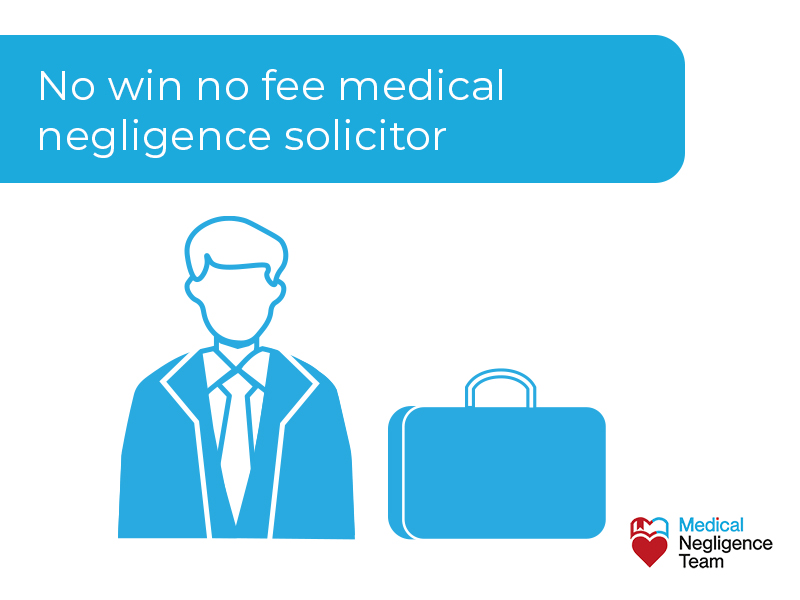
How long do I have to make a claim for Never Event negligence?
You have three years to make a claim for Never Event negligence. All medical negligence claims are subject to limitation periods.
For example, in England and Wales, medical negligence claims must generally be brought and court proceedings issued within three years of the injury or three years of knowledge of the facts giving rise to the claim.
If someone has passed away, it is the date of death if the limitation period has not expired at the date of death.
Children not under a disability typically have until they reach 21 to start a Never Event negligence claim or court proceedings.
Persons under a disability, who lack capacity, are not subject to any limitation period.
Can I make a medical negligence claim against the NHS?
Yes, you can make a medical negligence claim against the NHS. Suing the NHS for negligence is not unusual. People sue the NHS for compensation for Never Event negligence and receive the money they deserve for the poor treatment.
There are between 8,000 and 10,000 successful medical negligence claims against the NHS each year. Amounts in compensation claims awarded against the NHS range from £1000 to over £10 million.
The compensation you receive covers minor injuries such as scarring to serious life-threatening negligence, which leaves you with long-term care needs.
We trust in and use the NHS daily and do not expect negligence. It happens, though, and the NHS has a dedicated team to handle medical negligence compensation claims, called NHS resolution.
NHS Resolution has a responsibility to treat patients who seek compensation fairly. Patients pay for the NHS through their taxes, and for that they deserve respect and the best medical treatment.
Contact The Medical Negligence Team
Contact the Medical Negligence Team today to discuss your Never Event negligence claim for compensation. We have both the legal and medical experts to guide you along the steps to a successful medical negligence claim for compensation.
At the Medical Negligence Team, we fight every compensation claim on a No Win No Fee basis. You will not be out of pocket for an unsuccessful claim.
We have a very high success rate and a reputation for a speedy and successful resolution to all medical negligence cases.
Our 100% Compensation Guarantee puts all the money you win into your pocket. You or your loved one suffered from Never Event negligence, and you deserve every penny of the compensation claim.
Contact us at the Medical Negligence Team for all your medical negligence needs.


